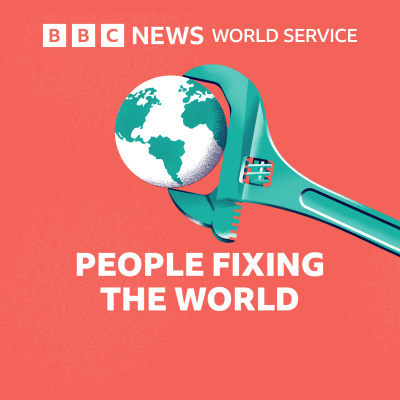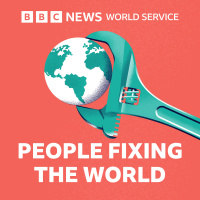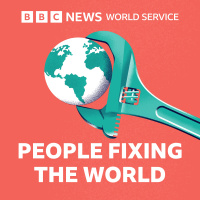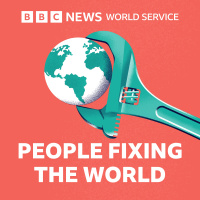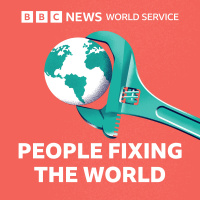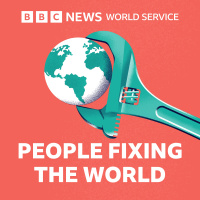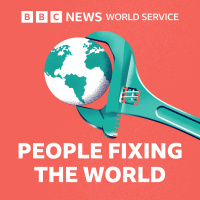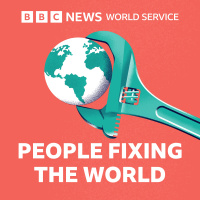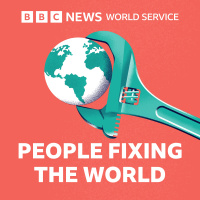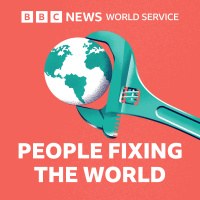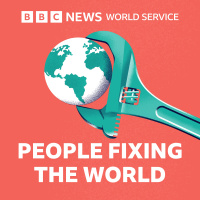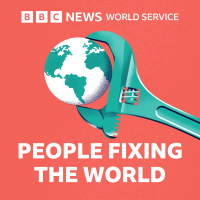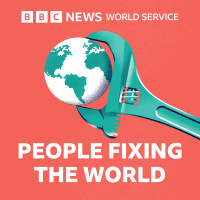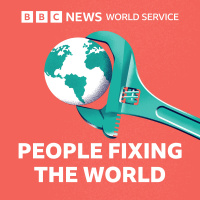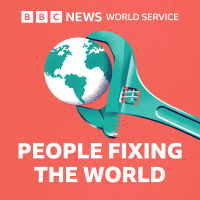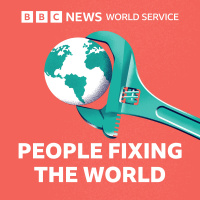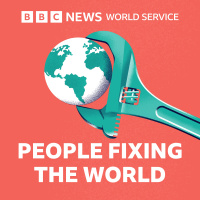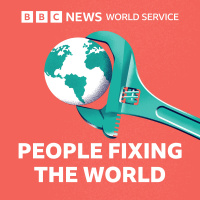Sinopsis
Brilliant solutions to the worlds problems. We meet people with ideas to make the world a better place and investigate whether they work.
Episodios
-
Saving mums and their unborn babies
22/12/2020 Duración: 24minWomen in a village in Northern Nigeria have come up with an emergency transport scheme that is saving lives. They decided to act when they saw mums-to-be and their unborn babies dying in childbirth because they couldn’t get to hospital in time. Their solution also inspired the state government to help thousands of other women. Produced and presented by Bara’atu Ibrahim
-
Making meat in a lab
15/12/2020 Duración: 24minImagine if the meat we ate was all grown in shiny silver vats, with no animals harmed in the process. That’s the vision of start-ups around the world, each trying to perfect lab-grown or cultured meat. It’s a huge challenge in bioengineering to make it work at a cheap enough price. But there are big benefits for the planet if they can pull it off. Presented by Amy Elizabeth Produced by Amy Elizabeth and Tom Colls Image: Lab-grown meat produced by Memphis Meat
-
Building with fungi
08/12/2020 Duración: 23minCompanies are growing light and durable packaging from mycelium that is easy to compost. Another team in Europe is creating a fungal home, which will sense when it’s dark and switch the lights on. And researchers in the UK are developing strains of fungi that won’t just replace plastic, but eat it as well. Produced and presented by Claire BatesPicture: Getty Images
-
Perovskites: The future of solar?
01/12/2020 Duración: 23minA new kind of solar cell - made by drying a special liquid on a surface - is being heralded as a revolution in solar power. The minerals known as perovskites were discovered more than 150 years ago. More recently, their crystal structure has been copied using other materials and used to produce energy.If it can be made to work, these crystals could be used to literally print out solar cells to put on skyscraper walls, furniture and electrical gadgets. Produced and presented by Tom CollsImage: Olga from Saule Technology
-
Riding the solar railway
24/11/2020 Duración: 24minCan you make the railways greener by powering trains with energy from the sun? We hear about the pioneering train in Australia that’s run entirely on solar power. Plus we visit the solar farm that’s plugged directly into a railway in Britain and hear about Indian Railways’ big plan for converting to renewable power.Produced and presented by Richard Kenny
-
From prison to star employee
17/11/2020 Duración: 27minWhy former criminals are being chosen for jobs at hundreds of companies in a small US city.One boss even tells us that some violent and sex offenders have become her best employees. Produced and presented by Jo MathysPhoto: Getty Images
-
Audience takeover: Your questions answered
10/11/2020 Duración: 23minAudience members praise and pick holes in solutions we’ve covered. Nick Holland and Kat Hawkins hear the best comments and questions and try to get answers. Among the solutions under review is a story about a man who regrew a rainforest in Ecuador. One listener is worried it’ll just get cut down again when he dies. And eyebrows are raised about nurses in Kenya using motorbikes to rescue snakebite victims. Producer: Nick Holland
-
Teenage inventor special
03/11/2020 Duración: 23minIn this inspiring episode, we hear ideas from high school students in Asia, Africa, Europe and America. They’ve created a new form of sound insulation, refined a forensic process to use at crime scenes, won an award for predicting crop yields and made going to the beach a little safer in the age of Covid. Image: Team Hibla from the Philippines.
-
Saving Cape Cod’s dolphins
27/10/2020 Duración: 25minThe mass stranding of dolphins, orcas and whales is depressingly common. We join a team on the East Coast of the United States who have dramatically improved the survival rates of beached dolphins there. And we are with them as they fight to save a dolphin mother and calf. Plus we look at how Silicon Valley AI tech, and its power to understand dolphin communication, could lead to even more being saved. Produced and Presented by Ben Wyatt Picture credit: Getty Images
-
How to put the internet in a box
20/10/2020 Duración: 24minWhat happens when you take a little box containing some of the vast knowledge amassed on the internet, to communities that live offline? From a peaceful valley in the remote Himalayas to a bustling Rohingya refugee camp, people are carrying gigabytes of data - from school curricula to the whole of Wikipedia - into places where access to the internet is impossible. Inspired by one of our listeners, we delve into the world of the “sneakernet” - a network of people who carry information to places where the signal doesn’t reach. Produced and presented by Tom CollsPhoto Credit: Getty
-
How jellyfish can help us
13/10/2020 Duración: 25minJellyfish blooms can cause havoc, scaring away tourists, clogging up fishing nets, and even getting stuck in power station cooling pipes. But scientists are finding ways to use the creatures to help us solve some big problems. They think jellyfish mucus could filter microplastics from our water systems, and their collagen could help us develop new medicines. And some want to see jellyfish on our plates. Produced and presented by Ruth Evans Picture credit: Getty Images
-
Training police to patrol each other
06/10/2020 Duración: 25minA growing number of police departments in the US are introducing a new concept in their training - teaching officers on the beat how to step in when they see a colleague doing something they don't think is right. After the killing of George Floyd and the Black Lives Matter protests, a programme pioneered by police in New Orleans is being developed for other forces. Presented and produced by Daniel Gordon.Picture credit: Getty Images
-
Getting rid of AI bias
29/09/2020 Duración: 23minIt’s not just search engines that are powered by artificial intelligence. From the courts to the jobs market, AI is influencing decisions that have a big impact on people’s lives. But researchers now believe that not all people are treated equally by some algorithms. They’ve found potential bias - influenced by race, class and gender - can have an impact on the decisions that computers make. Some programmers, computer scientists and entrepreneurs hope to fight this bias, using the technology that created it in the first place. Produced and presented by Craig LangranImage: Getty Images
-
How to prevent drowning
22/09/2020 Duración: 23minWe hear how AI lifeguards are helping to spot danger on Israel’s beaches, while on Lake Victoria special forecasts for fishermen are saving hundreds of lives. Meanwhile in Bangladesh, community creches and bamboo swimming stages are reducing deaths among children – the group at highest risk of drowning. It’s estimated that 320,000 people around the world die in the water each year. Produced and presented by Claire BatesPhoto: Getty Images
-
Smartphones saving the rainforest
15/09/2020 Duración: 24minOld smartphones powered by solar panels are being used to catch illegal loggers in rainforests across the world. Each year, more than 150 million mobiles are discarded in the US alone - so we’re looking at clever ways to reuse them. But should we really rethink our consumer habits and keep our phones for longer? Produced and presented by Julie Ball.Photo: Rainforest Connection
-
A happier planet
08/09/2020 Duración: 23minLooking for the happiest places in the world. We follow in the tracks of someone who gave up his job to cycle round the world to investigate happiness. From Costa Rica to Canada to Bhutan - what are the best ways of bringing about a happier planet?
-
Keeping data forever
01/09/2020 Duración: 23minCould your family photos end up being stored on a piece of glass? Might you find yourself saving a file to DNA storage? Or downloading a video from a data centre in space?Current methods of storing information are susceptible to decay and have limited capacity but novel approaches could provide plentiful storage so that our selfies outlast our species. Reporter/ Producer William Kremer for the BBC World Service. Picture credit: Southampton University
-
Could a device invented in the 1930s help end period poverty?
25/08/2020 Duración: 24minPeriod poverty affects girls and women across the world who can’t afford to buy sanitary pads or tampons each month. So what are the alternatives? In a refugee camp in Jordan, we follow one woman as she tries to get a sanitary pad micro-factory off the ground. While in Malawi, they’re handing out menstrual cups to teenagers.This podcast was first published on 7 May 2019Presenter: Vibeke Venema Producer: Tom Colls(Photo Caption: A menstrual cup / Photo Credit: Getty Images)
-
The mums saving each other from a taboo condition
18/08/2020 Duración: 24min"Get rid of the girl who smells" - this is the reaction thousands of traumatised new mothers face every year because of a condition called fistula. But in Madagascar some women, who have successfully been treated, become patient ambassadors finding others with the same condition. They personally accompany them to clinics to get life-changing surgery and support. This podcast was first published on 2 April 2019.Reporter/ Producer: Amelia Martyn-Hemphill (Photo: Felicia - a patient ambassador in Madagascar)
-
The tech doctors forecasting heart failure
11/08/2020 Duración: 24minMonitoring devices implanted in a person’s chest are helping doctors predict if something is about to go wrong with a patient’s heart. Sometimes they can tell a month in advance. It’s allowing cardiologists to adjust treatment and prevent problems before they occur. Produced and presented by Nick Holland.
